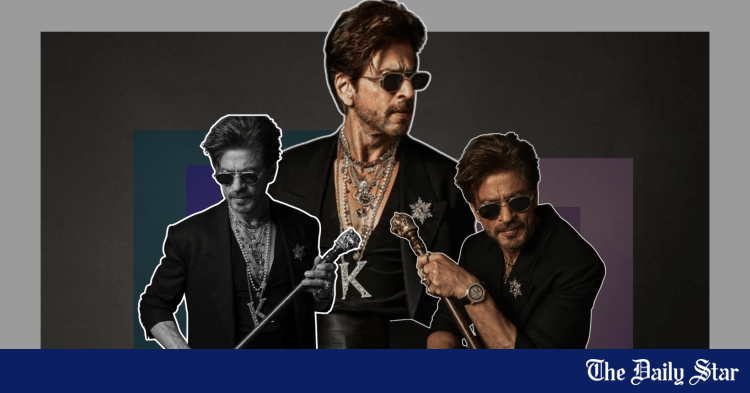Sun Nov 2, 2025 10:51 AM
Last update on: Sun Nov 2, 2025 11:00 AM
Arts & Entertainment Desk
Sun Nov 2, 2025 10:51 AM Last update on: Sun Nov 2, 2025 11:00 AM
Photos: Collected | Visual: Dowel Biswas
“>
Photos: Collected | Visual: Dowel Biswas
Before the world knew his name, a boy from Delhi was rehearsing confidence like a prayer. Shah Rukh Khan didn’t arrive in Bombay on a chariot of destiny; he came by train, with a bruised heart, a theatre degree, and an impossible dream. The son of a freedom fighter and a dreamer from Peshawar, he carried loss like a shadow — both parents gone before he was 25 — and turned that grief into fuel. From that pain, he built something larger than cinema: a new idea of the Indian man.
In the 1990s, Hindi cinema worshipped muscle and larger-than-life stardom. Khan, lean and quick-witted, rewrote the archetype. He smiled where others scowled, cried where others conquered. As a cunning, psychopathic villain in “Baazigar” and “Darr,” he revealed his range; as the romantic ideal in “Dilwale Dulhania Le Jayenge” and “Kuch Kuch Hota Hai,” he captured hearts; in “Kabhi Khushi Kabhie Gham,” he became the son every Indian family longed for; and in “Devdas”, he embodied tragic passion. For a country learning to dream amid globalisation, he became the face of emotional ambition — love as both rebellion and refuge.

His secret was duality: he was both a lover and a philosopher, an outsider and a king. He wasn’t born to power, but performed it until the world believed him. His self-deprecating wit disarmed critics. His interviews read like essays in survival — lessons in how to face scrutiny without surrendering grace. “Success is not a good teacher,” he once said. “Failure makes you humble.”
Off-screen, he built a life as carefully as his image. He married Gauri, his Hindu sweetheart, in a time when such unions carried a quiet risk. He made faith private but ethics visible, a secular man in a polarising climate. He rarely sermonised, but his screen presence alone — a Muslim hero in Hindu love stories — became an act of pluralism. His home, “Mannat”, turned into both monument and metaphor: a place where outsiders could imagine arrival.
To call him “the last superstar” is not nostalgia; it’s precision. The industry he ruled was powered by myth, not metrics. His fame grew in theatres, not timelines. A single face once united balcony and stalls, diaspora and domestic, that kind of stardom no longer exists. His charisma thrived on access, not mystery: the illusion that you could know him, and through him, know yourself.
Even as the industry changed, Khan endured by reinventing. He built “Red Chillies Entertainment”, a sleek production house that invested early in VFX and digital ownership. He bought an IPL team, mixing sport with showmanship. He mastered irony, mocking his superstardom while embodying it. “I am the best,” he declared once, half-truth, half theatre.
Then came the drought. A string of box-office flops in the late 2010s made even fans wonder if the SRK era had ended. But when “Pathaan” and “Jawan” roared into cinemas in recent years, it wasn’t just a comeback — it was resurrection. Crowds danced again in theatres. Fans threw confetti. The screen cracked open with energy long missing. Charisma, it turned out, doesn’t die; it hibernates.
At his 60th today, Khan returned not younger but freer — an artist who no longer needed to prove his stardom, only to inhabit it. To watch him now is to see a man who has outlived his myth yet continues to dance with it. He remains, at heart, a theatre boy: restless, witty, romantic, endlessly self-mocking.
His TED Talk distilled that ethos — an “aging movie star” who still believes in stories as salvation. It was part comedy, part confession, part manifesto. “Humanity is a lot like me,” he told the crowd, “an aging movie star, trying to make a comeback.” That ability to turn metaphor into mirror is what keeps him singular.
Global media have tried to define him. The Guardian calls him “king of Bollywood”. The Financial Times analyses him as India’s most successful cultural export. Forbes tallies his billions. But numbers can’t explain endurance. His empire is emotional: built on identification, not intimidation.
He is also the last of a kind — the rare star whose fame was inseparable from moral imagination. He offered India a vision of masculinity that felt both strong and soft, aspirational yet accessible. In his laughter, people found hope; in his heartbreak, reflection. He proved that gentleness could still be heroic, and that charisma need not cancel humility.
Even his failures were instructive. They showed how deeply the audience’s expectations were tied to him. When “Zero” faltered, it wasn’t disbelief in him — it was disbelief in seeing him diminished. That attachment, that unbroken line of feeling between audience and star, is what defines old-school superstardom.
When film historians write of this century’s Hindi cinema, they’ll speak of the Khans — but only one bridged eras, ideologies, and industries. Shah Rukh Khan did not just survive globalisation; he personified it. He didn’t just act in love stories; he rewrote the grammar of desire for a billion people.
He may one day leave the screen, but the language he gave it — witty, emotional, defiantly human — will endure. He didn’t merely play the hero; he redefined what one could mean.
And that, more than his box-office numbers or global endorsements, is why he remains the last of his kind: the superstar who taught us that to be larger than life, you must first be achingly human.

